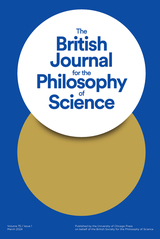
Tepe Yahya provides a stratigraphic sequence that stretches some 6,000 years, from the Neolithic period to the early centuries AD. As a result, the site is critical for understanding cultural processes in southeastern Iran.
In this volume of results of the excavations at Tepe Yahya, Peter Magee presents evidence from the Iron Age occupation of the site. Looking beyond the epigraphic and historical data and examining the insights provided by the artifactual record, Magee describes how a small settlement, located some distance from the main centers of power, came into being and was affected by the emergence of the Achaemenid imperial system, which stretched from Pakistan to Libya.

Situated roughly midway between the great cities of the Indus Valley and those of the Mesopotamian plains, Tepe Yahya occupies a special place in our conceptions of relations between these distant territories during the early Bronze Age. Its third-millennium levels, dating from 3000 to 2100 BC, are particularly important.
In this definitive study, D. T. Potts describes the stratigraphy, architecture, ceramics, and chronology of the site and presents a full inventory of the small finds. Holly Pittman contributes comprehensive illustrations and a discussion of the seals and sealings, and Philip Kohl provides an analysis of the carved chlorite industry. In a foreword and afterword, project director C. C. Lamberg-Karlovsky tells the story of the archaeological expedition and reflects on the contributions of the Tepe Yahya project.

This comprehensive study of the Proto-Elamite language (ca. 3000 BC) is based on a small archive recovered from the site of Tepe Yahya in southeastern Iran. The authors, two of the leading specialists on the most ancient written texts of the Near East, illuminate the structure of the texts, the numerical sign systems used, and the relation of Proto-Elamite to other protocuneiform writing systems. A computer-generated sign list compares the written archive from Tepe Yahya with those of other archaeological sites from which Proto-Elamite texts have been recovered.
The volume offers a new understanding of the language and culture of the Proto-Elamites as well as important insights into the economic structure of the earliest literate civilizations. With a new preface by the authors.


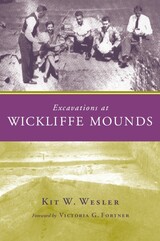
Wesler provides an impressive and definitive compilation of more than 70 years of archaeological excavations at one of the most important
archaeological sites in Kentucky.
The Wickliffe Mounds site is located on a bluff overlooking the Mississippi River in Ballard County, Kentucky, about three miles south of the mouth of the Ohio River. Around A.D. 1100, Mississippian people--farmers and traders with a culture closely related to the historic cultures of the Southeast (Chickasaw, Choctaw, Creek, and others)—created a settlement there on which they lived for approximately 250 years before moving on.
In 1930 road construction cut a channel through the site, revealing archaeological deposits and bringing the area to the attention of Fain King, a local lumberman and entrepreneur. King bought the site in hopes of turning it into an attraction for the education and entertainment of the public, and not incidentally for his own profit. For more than 50 years the area was subjected to excavations ranging from looting to professional research efforts. In 1983, the site was finally turned over to Murray State University to be developed into an academic facility dedicated to research, student training, public education, and preservation of the site and its collections. Fortunately, the Wickliffe collections include all the early excavation records as well as more than 85,000 artifacts, 90% of which had been catalogued. Between 1984 and 1996 excavations were conducted specifically to affirm questionable data and/or fill in gaps in the Wickliffe archaeological record.
In this volume, Wesler and his colleagues have compiled data from almost seven decades of excavations at Wickliffe Mounds, providing the first comprehensive study of this important site. The paperback version of the book is accompanied by a CD-ROM that contains contributions from a wide range of archaeological specialists and includes archaeological data, site maps, database files, plats of excavations, artifact descriptions, and photographs, compiling in one place the entire archaeological record for this very important eastern North American site.
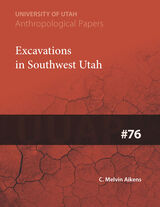
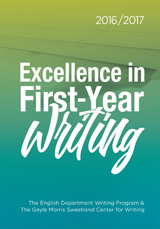
Every day, students at the University of Michigan work hard to develop their skills as writers. Every winter, we have a chance to sample the fruits of this labor as we select winners for the first-year writing prize. The English Department Writing Program and the Sweetland Center for Writing established a first-year writing prize in 2010. With generous support from the Sweetland Center for Writing, Andrew Feinberg and Stacia Smith (both of whom earned English degrees from the University of Michigan), and the Granader Family, we have developed a tradition of honoring students who produce writing of exceptional quality.
In this collection, we share the writing of prize-winning students so that other writers may learn from, and feel inspired by, their examples. The featured essays illustrate how writers formulate compelling questions, engage in dialogue with other thinkers, incorporate persuasive and illuminating evidence, express powerful and poetic insights, and participate in meaningful conversations.
We are equally grateful to the many students who submitted essays for these writing prizes and the many instructors who encouraged and supported them. As writing teachers, we relish the opportunity to learn from the challenging questions, intellectual energy, creativity, and dedication that our students and their teachers bring to our classrooms. We hope that you will gain as much pleasure as we have from reading the writing contained in this volume.

Every day, students at the University of Michigan work hard to develop their skills as writers. Every winter, we have a chance to sample the fruits of this labor as we select winners for the first-year writing prize. The English Department Writing Program and the Sweetland Center for Writing established a first-year writing prize in 2010. With generous support from the Sweetland Center for Writing, Andrew Feinberg and Stacia Smith (both of whom earned English degrees from the University of Michigan), and the Granader Family, we have developed a tradition of honoring students who produce writing of exceptional quality.
In this collection, we share the writing of prize-winning students so that other writers may learn from, and feel inspired by, their examples. The featured essays illustrate how writers formulate compelling questions, engage in dialogue with other thinkers, incorporate persuasive and illuminating evidence, express powerful and poetic insights, and participate in meaningful conversations.
We are equally grateful to the many students who submitted essays for these writing prizes and the many instructors who encouraged and supported them. As writing teachers, we relish the opportunity to learn from the challenging questions, intellectual energy, creativity, and dedication that our students and their teachers bring to our classrooms. We hope that you will gain as much pleasure as we have from reading the writing contained in this volume.
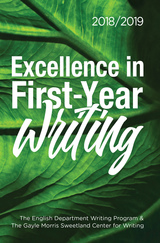
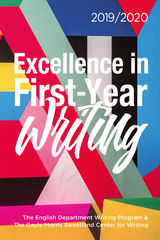
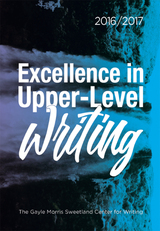
Ask any professional, business person, or employer about one of the most important qualifications for college-educated workers, and the answer will be nearly universal: the ability to write well. The Upper-Level Writing Requirement (ULWR) was established to enable undergraduates in the College of Literature, Science, and the Arts to develop their capacities as writers. Originally designed in 1978 to help students “understand and communicate effectively the central concepts, approaches, and materials of their discipline,” the ULWR supports a slightly different goal in today’s more interdisciplinary context. A significant percentage of students now have more than one major or fulfill the ULWR outside of their majors. Likewise, many faculty members are increasingly concerned with preparing students to write for various professional and public audiences as well as for discipline-based ones. However, whether students fulfill the ULWR within or outside of their majors or write for audiences within or outside of the academy, they are held to the same standards of effective writing.
This collection demonstrates the continuing value of the ULWR. Courses like the ones in which students produced these essays create contexts where students meet the expectations of the ULWR and can push beyond them to an even more impressive level of accomplishment. While the specifics of what counts as evidence and how one makes a convincing argument vary across the essays included here, each one embodies qualities that mark effective writing. The authors deal with a wide variety of topics, but in every case they combine deep understanding of a specific area with excellent prose. They take risks and adhere to conventions; they synthesize complex ideas and provide rich detail; they exert intellectual independence and respect disciplinary conventions, from creative nonfiction in the humanities to empirical research in the sciences.
We have been honoring students for outstanding writing in ULWR courses since 2010, but since 2014, thanks to a generous gift from the Granader Family, the prizes are more substantial. We are grateful to the Granaders for choosing to recognize student writing in this way. This collection is another form of recognition for the award-winning students. By publishing this student writing both online and in hard copy we make it available as a model and as a source of inspiration for others.
Talented and committed as they are, these students represented here did not become award-winners entirely on their own. Each of them benefited from well-designed assignments, careful reading, and suggestions for revision from the instructors who nominated them. The instructors’ introductions for each selection provide a window into student learning as well as into the specific dimensions of each student’s achievements.

Ask any professional, business person, or employer about one of the most important qualifications for college-educated workers, and the answer will be nearly universal: the ability to write well. The Upper-Level Writing Requirement (ULWR) was established to enable undergraduates in the College of Literature, Science, and the Arts to develop their capacities as writers. Originally designed in 1978 to help students "understand and communicate effectively the central concepts, approaches, and materials of their discipline," the ULWR supports a slightly different goal in today's more interdisciplinary context. A significant percentage of students now have more than one major or fulfill the ULWR outside of their majors. Likewise, many faculty members are increasingly concerned with preparing students to write for various professional and public audiences as well as for discipline-based ones. However, whether students fulfill the ULWR within or outside of their majors or write for audiences within or outside of the academy, they are held to the same standards of effective writing.
This collection demonstrates the continuing value of the ULWR. Courses like the ones in which students produced these essays create contexts where students meet the expectations of the ULWR and can push beyond them to an even more impressive level of accomplishment. While the specifics of what counts as evidence and how one makes a convincing argument vary across the essays included here, each one embodies qualities that mark effective writing. The authors deal with a wide variety of topics, but in every case they combine deep understanding of a specific area with excellent prose. They take risks and adhere to conventions; they synthesize complex ideas and provide rich detail; they exert intellectual independence and respect disciplinary conventions, from creative nonfiction in the humanities to empirical research in the sciences.
We have been honoring students for outstanding writing in ULWR courses since 2010, but since 2014, thanks to a generous gift from the Granader Family, the prizes are more substantial. We are grateful to the Granaders for choosing to recognize student writing in this way. This collection is another form of recognition for the award-winning students. By publishing this student writing both online and in hard copy we make it available as a model and as a source of inspiration for others.
Talented and committed as they are, these students represented here did not become award-winners entirely on their own. Each of them benefited from well-designed assignments, careful reading, and suggestions for revision from the instructors who nominated them. The instructors' introductions for each selection provide a window into student learning as well as into the specific dimensions of each student's achievements.
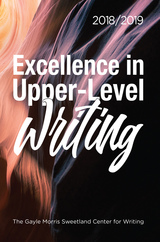
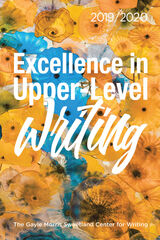

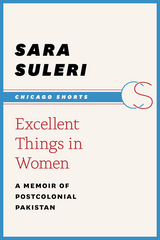
Sometimes, only the most heartbreaking memories possess the capacity—in their elegiac immediacy—to take our breath away. With Excellent Things in Women, Sara Suleri offers the reader a delicately wrought memoir of life in postcolonial Pakistan. Suleri intertwines the violent history of Pakistan's independence with her own intimate experiences—relating the tumult of growing up female during a time of fierce change in the Middle East in the 1960s and ’70s. In the two selections presented here, “Excellent Things in Women” and “Meatless Days,” we watch as Suleri re-encounters the relationships that inform her voyage from adolescence to womanhood—with her Welsh mother; her Pakistani father, prominent political journalist Z. A. Suleri; and her tenacious grandmother, Dadi, along with her five siblings—as she comes to terms with the difficulties of growing up and her own complicated passage to the West.
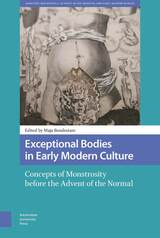


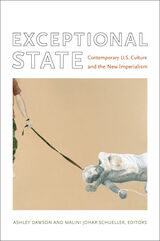
The contributors address a range of topics, paying particular attention to the dynamics of gender and race. Their essays include a surprising reading of the ostensibly liberal movies Wag the Dog and Three Kings, an exploration of the rhetoric surrounding the plan to remake the military into a high-tech force less dependent on human bodies, a look at the significance of the popular Left Behind series of novels, and an interpretation of the Abu Ghraib prison photos. They scrutinize the national narrative created to justify the U.S. invasions of Afghanistan and Iraq, the ways that women in those countries have responded to the invasions, the contradictions underlying calls for U.S. humanitarian interventions, and the role of Africa in the U.S. imperial imagination. The volume concludes on a hopeful note, with a look at an emerging anti-imperialist public sphere.
Contributors. Omar Dahbour, Ashley Dawson, Cynthia Enloe, Melani McAlister, Christian Parenti, Donald E. Pease, John Carlos Rowe, Malini Johar Schueller, Harilaos Stecopoulos
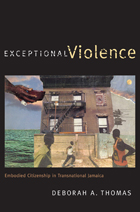
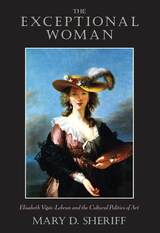
In The Exceptional Woman, Mary D. Sheriff uses Vigée-Lebrun's career to explore the contradictory position of "woman-artist" in the moral, philosophical, professional, and medical debates about women in eighteenth-century France. Paying particular attention to painted and textual self-portraits, Sheriff shows how Vigée-Lebrun's images and memoirs undermined the assumptions about "woman" and the strictures imposed on women.
Engaging ancien-régime philosophy, as well as modern feminism, psychoanalysis, literary theory, and art criticism, Sheriff's interpretations of Vigée-Lebrun's paintings challenge us to rethink the work and the world of this controversial woman artist.
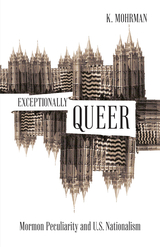
How perceptions of Mormonism from 1830 to the present reveal the exclusionary, racialized practices of the U.S. nation-state
Are Mormons really so weird? Are they potentially queer? These questions occupy the heart of this powerful rethinking of Mormonism and its place in U.S. history, culture, and politics. K. Mohrman argues that Mormon peculiarity is not inherent to the Latter-day Saint faith tradition, as is often assumed, but rather a potent expression of U.S. exceptionalism.
Exceptionally Queer scrutinizes the history of Mormonism starting with its inception in the early 1830s and continuing to the present. Drawing on a wide range of historical texts and moments—from nineteenth-century battles over Mormon plural marriage; to the LDS Church’s emphases on “individual responsibility” and “family values”; to mainstream media’s coverage of the LDS Church’s racist exclusion of Black priesthood holders, its Native assimilation programs, and vehement opposition to the Equal Rights Amendment; and to much more recent legal and cultural battles over same-sex marriage and on-screen Mormon polygamy—Exceptionally Queer evaluates how Mormonism has been used to motivate and rationalize the biased, exclusionary, and colonialist policies and practices of the U.S. nation-state.
Mohrman explains that debates over Mormonism both drew on and shaped racial discourses and, in so doing, delineated the boundaries of whiteness and national belonging, largely through the consolidation of (hetero)normative ideas of sex, marriage, family, and economy. Ultimately, the author shows how discussions of Mormonism in this country have been and continue to be central to ideas of what it means to be American.
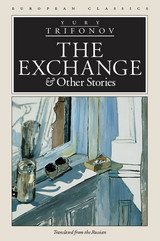
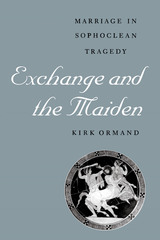
Marriage is a central concern in five of the seven extant plays of the Greek tragedian Sophocles. In this pathfinding study, Kirk Ormand delves into the ways in which these plays represent and problematize marriage, thus offering insights into how Athenians thought about the institution of marriage.
Ormand takes a two-fold approach. He first explores the legal and economic underpinnings of Athenian marriage, an institution designed to guarantee the legitimate continuation of patrilineal households. He then shows how Sophocles' plays Trachiniae, Electra, Antigone, Ajax, and Oedipus Tyrannus both reinforce and critique this ideology by representing marriage as a homosocial exchange between men, in which women are objects who may attempt—but always fail—to become self-acting subjects.
These fresh readings provide the first systematic study of marriage in Sophocles. They draw important connections between drama and marriage as rituals concerned with controlling potentially disruptive female subjectivities.
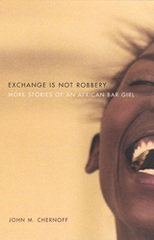
In Exchange Is Not Robbery and its predecessor, Hustling Is Not Stealing, a chronicle of exploitation is transformed by verbal art into an ebullient comedy. In Hustling Is Not Stealing, Hawa is a playful warrior struggling against circumstances in Ghana and Togo. In Exchange Is Not Robbery, Hawa returns to her native Burkina Faso, where she achieves greater control over her life but faces new difficulties. As a woman making sacrifices to live independently, Hawa sees her own situation become more complex as she confronts an atmosphere in Burkina Faso that is in some ways more challenging than the one she left behind, and the moral ambiguities of her life begin to intensify.
Combining elements of folklore and memoir, Hawa's stories portray the diverse social landscape of West Africa. Individually the anecdotes can be funny, shocking, or poignant; assembled together they offer a sweeping critical and satirical vision.
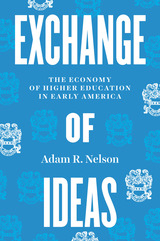
Exchange of Ideas launches a breathtakingly ambitious new economic history of American higher education. In this volume, Adam R. Nelson focuses on the early republic, explaining how knowledge itself became a commodity, as useful ideas became salable goods and American colleges were drawn into transatlantic commercial relations. American scholars might once have imagined that higher education could sit beyond the sphere of market activity—that intellectual exchange could transcend vulgar consumerism—but already by the end of the eighteenth century, they saw how ideas could be factored into the nation’s balance of trade. Moreover, they concluded that it was the function of colleges to oversee the complex process whereby knowledge could be priced and purchased. The history of capitalism and the history of higher education, Nelson reveals, are intimately intertwined—which raises a host of important and strikingly urgent questions. How do we understand knowledge and education as commercial goods? Who should pay for them? And, fundamentally, what is the optimal system of higher education in a capitalist democracy?
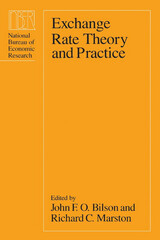
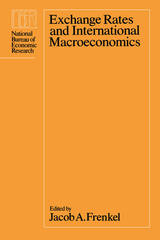
Both empirical and theoretical research are represented, and the contributors analyze such issues as the performance of various models of exchange rate determination, the role of risk and speculation in the forward market for foreign exchange, the rational expectations hypothesis in such markets, the performance of monetary policy in ten industrial countries, the role that labor market contracts play in exchange rate policies, the effect of he oil shocks on the evolution of exchange rates, and the output cost of bringing down inflation in the open economy.
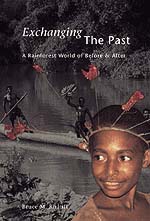
In this book, Knauft explores the Gebusi's encounter with modern institutions and highlights what their experience tells us more generally about the interaction between local peoples and global forces. As desire for material goods grew among Gebusi, Knauft shows that they became more accepting of and subordinated by Christian churches, community schools,and government officials in their attempt to benefit from them—a process Knauft terms "recessive agency." But the Gebusi also respond actively to modernity, creating new forms of feasting, performance, and music that meld traditional practices with Western ones, all of which Knauft documents in this fascinating study.

What can teachers in British and American inner-city schools learn from each other about literacy training? To explore this question, Sarah Warshauer Freedman and her British colleagues set up a writing exchange that matched classes from four middle and high schools in the San Francisco Bay area with their London equivalents.
Exchanging Writing, Exchanging Cultures offers concrete lessons to school reformers, policymakers, and classroom teachers about the value and effectiveness of different approaches to teaching writing. Freedman goes beyond the specific subject matter of this study, looking anew at Vygotsky's and Bakhtin's theories of social interaction and addressing the larger questions of the relationship between culture and education.


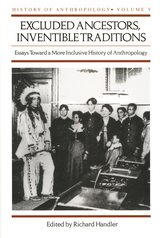
Excluded Ancestors, Inventible Traditions focuses on little-known scholars who contributed to the anthropological work of their time, such as John William Jackson, the members of the Hampton Folk-Lore Society, Charlotte Gower Chapman, and Lucie Varga. In addition, essays on Marius Barbeau and Sol Tax present figures who were centrally located in the anthropologies of their day. A final essay analyzes notions of "the canon" and considers the place of a classic ethnographic area, highland New Guinea, in anthropological canon-formation.

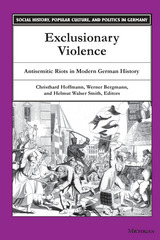
In the Western mind, outbursts of collective violence against Jews have been largely identified with Tzarist Russia and the medieval crusade massacres. However, by narrating pogroms as archaic, historians have overlooked their significance to the development of modern antisemitism in Germany and Europe as well as the reasons for its continued presence in the contemporary world. The evidence presented in this volume suggests that acts of exclusionary violence were not dead-end streets of futile protest. Rather, they were rehearsals for new kinds of destruction.
The integration of various perspectives and the close cooperation of scholars from different disciplines is a major achievement of this volume, which will be of interest to advanced undergraduates, graduate students, academics and the general reader in a variety of disciplines, including German studies, Jewish studies, Holocaust and genocide studies, ethnic relations, history, and the social sciences in general.
Christhard Hoffmann is Associate Professor of Modern European History, University of Bergen, Norway. Werner Bergmann is Professor of Research on Antisemitism, Technical University, Berlin, Germany. Helmut W. Smith is Associate Professor of History, Vanderbilt University.


In the mid-1800s, Judson argues, German liberal activists built an effective political movement whose ideology was rooted in its members' social experience in voluntary associations. The liberals were committed to the creation of a market economy based on personal property rights, to a society based on the values of individual self-improvement and personal respectability, and to a fundamental distinction between active and passive citizenship. They were determined to achieve a harmonious community of free peoples, in which personal enlightenment would bring an end to the divisive influence of localism, ethnicity, religion, and feudal social hierarchy.
Yet after 1880, as newer, more radical mass political movements threatened their political fortunes, the liberals forged a German nationalist politics based increasingly on ethnic identity. Their emphasis on national identity became a way for former liberals to hold together an increasingly diverse coalition of German speakers who had little in common outside of their shared language. Only "Germanness" bridged the dangerous gulf between social classes. This nationalism helped the liberals to compete for power in the multinational, multicultural Austrian Empire down to 1914, but it left a legacy of nationalist extremism and tolerance of anti-Semitism that continues to influence political cultures in the former lands of the Habsburg Monarchy today.
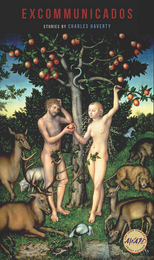
A sixteen-year-old boy unearths grisly evidence of his genteel grandfather’s racist past. At his sister’s booze-soaked destination wedding, a recovering alcoholic English professor is finagled into ghostwriting their unreliable father’s nuptial toast. A small town lawyer’s Edenic existence is jeopardized when his wife’s younger brother is arrested for a rash of local burglaries. In the wake of her daughter’s brush with disaster in the Haiti earthquake, a mother finds herself drawn down a dark neighborhood sidewalk toward what might or might not be a dead body. And in the title story—the first of three linked stories—a pious altar boy confronts the twin mysteries of sex and death through the auspices of a classmate’s divorced mother.
There are secrets at the center of each of these daring and original stories—secrets that separate these characters from one another but grow in the mind and the heart, connecting them with all of us.
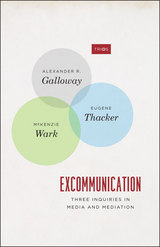

Focusing on the struggles and quandaries of everyday life, Jackson touches on matters at the core of anthropology—the state, violence, exile and belonging, labor, indigenous rights, narrative, power, home, and history. He is particularly interested in the gaps that characterize human existence, such as those between insularity and openness, between the things over which we have some control and the things over which we have none, and between ourselves and others as we talk past each other, missing each others’ meanings. Urging a recognition of the limits to which human existence can be explained in terms of cause and effect, he suggests that knowing why things happen may ultimately be less important than trying to understand how people endure in the face of hardship.

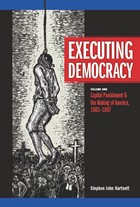
Executing Democracy: Capital Punishment & the Making of America, 1683-1807 is the first volume of a rhetorical history of public debates about crime, violence, and capital punishment in America. This examination begins in 1683, when William Penn first struggled to govern the rowdy indentured servants of Philadelphia, and continues up until 1807, when the Federalists sought to impose law-and-order upon the New Republic.
This volume offers a lively historical overview of how crime, violence, and capital punishment influenced the settling of the New World, the American Revolution, and the frantic post-war political scrambling to establish norms that would govern the new republic.
By presenting a macro-historical overview, and by filling the arguments with voices from different political camps and communicative genres, Hartnett provides readers with fresh perspectives for understanding the centrality of public debates about capital punishment to the history of American democracy.
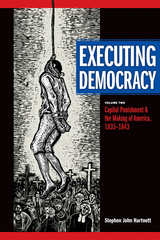
This eye-opening and well-researched companion to the first volume of Executing Democracy enters the death-penalty discussion during the debates of 1835 and 1843, when pro-death penalty Calvinist minister George Barrell Cheever faced off against abolitionist magazine editor John O’Sullivan. In contrast to the macro-historical overview presented in volume 1, volume 2 provides micro-historical case studies, using these debates as springboards into the discussion of the death penalty in America at large. Incorporating a wide range of sources, including political poems, newspaper editorials, and warring manifestos, this second volume highlights a variety of perspectives, thus demonstrating the centrality of public debates about crime, violence, and punishment to the history of American democracy. Hartnett’s insightful assessment bears witness to a complex national discussion about the political, metaphysical, and cultural significance of the death penalty.
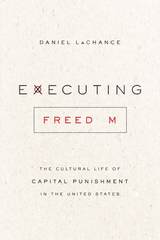
That question is at the heart of Executing Freedom, a powerful, wide-ranging examination of the place of the death penalty in American culture and how it has changed over the years. Drawing on an array of sources, including congressional hearings and campaign speeches, true crime classics like In Cold Blood, and films like Dead Man Walking, Daniel LaChance shows how attitudes toward the death penalty have reflected broader shifts in Americans’ thinking about the relationship between the individual and the state. Emerging from the height of 1970s disillusion, the simplicity and moral power of the death penalty became a potent symbol for many Americans of what government could do—and LaChance argues, fascinatingly, that it’s the very failure of capital punishment to live up to that mythology that could prove its eventual undoing in the United States.

Seventy-Five Years Ago, the Last American Soldier Who Paid the Ultimate Price for Desertion
A New Edition of the Acclaimed Investigative Story
In August 1944, a drab convoy of raw recruits destined to join the 28th Division lumbered along a windy French road strewn with dead animals, shattered bodies, and burning equipment. One of those draftees was 24-year-old Eddie Slovik, a petty thief from Detroit who had spent his youth in and out of reform schools. Eddie's luck had recently changed, however, with a steady factory job and marriage to a beautiful girl who gave Eddie hope and security for the first time in his life. But their honeymoon—like that of many other wartime newlyweds—was interrupted by the call to service. The convoy came under intense artillery fire, and in the confusion Slovik became separated from his unit. He joined a Canadian outfit and traveled with them before finally reporting to the 28th Division. He carried a rifle but no ammunition. He was assigned to a platoon but walked away. Refusing to kill, Slovik was arrested, court martialed, and condemned to death. Hundreds of soldiers were tried for desertion during World War II and sentenced to die, but only Eddie Slovik paid the price, supposedly as a deterrent, yet word of the nature of his death was never officially released to the public.
In The Execution of Private Slovik, considered to be among the best investigative books ever written, journalist and author William Bradford Huie reconstructs this entire story with the full cooperation of the U.S. Army in order to find out what made Eddie Slovik an unlikely pacifist and why the affair was covered up. Through interviews with those who knew him and the hundreds of letters to his wife, the author reveals a hard luck depression-era kid who when faced with the reality of war realized that he simply could not kill another human being. Throughout, Huie reveals how Eddie Slovik's death has much to tell us about life and duty to one's country. This edition marking the seventy-fifth anniversary of the sentence being carried out, contains a new introduction by the author's daughter.
Praise for The Execution of Private Slovik:
"In the hands of an expert, who writes both passionately and with an almost transparent effort to be fair to all concerned, the story raises questions to which our wisest leaders still lack satisfying answers."
—New York Times
"A remarkable story reported by a master."—W. E. B. Griffin
"Recommended reading for all military historians."—Military Affairs
"Tremendously moving."—The Atlantic
"It is very likely that William Bradford Huie's The Execution of Private Slovikwill long survive the official histories of World War II. It is a big book and Mr. Huie deserves some sort of rich reward for this unburying of an incident of the war which must disturb us all. For Slovik was more than a 'coward.' He not only did not want to die but he did not want to kill, and one must look far in literature for a figure so moving as Private Slovik wandering about Europe not with bullets in his cartridge belt but with writing paper. The question is not 'How might we improve military procedures?' The question is, 'What has happened to love in our world when he who would rather love than kill must die?'"—from a letter to the New York Times
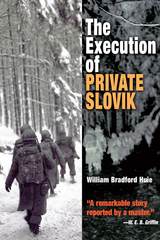

Executives today encounter social, psychological, and technical problems undreamed of by their predecessors. To help meet these challenges, Harry Levinson has written a thorough and timely revision of his acknowledged classic, The Exceptional Executive.
In Executive the author has added new material emphasizing the need for executive flexibility the ability to work with multiple constituencies, to mitigate tensions between middle and top management, to comprehend the social context within which business operates and to understand the needs of women and minorities. He has also added fourteen case studies that illuminate these major themes and problems.

A quiet revolution came to corporate America during the late 1980s and early 1990s. Large shareholders—pension funds, insurance companies, money manages, and commercial banks—exercised new-found muscle, pressuring senior managers to improve disappointing financial results by reshaping their organization. Michael Useem reveals how those investor pressures have transformed the inside structures of many corporations, better aligning them with shareholder interest.
Useem draws on numerous sources, including interviews with senior managers and intensive studies of seven large corporations representing a range of restructuring experiences and industries—including pharmaceuticals, transportation, chemicals, retailing, electronics, and financial services. He shows that organizational changes have affected many areas of corporate life: headquarters staffs have been reduced authority has filtered down to operating units, and compensation has become more closely tied to performance. Change also extends to corporate governance, where managers have fought back by seeking legal safeguards against takeovers and by staggering board terms. They’ve also put significant resources into building more effective relations with shareholders.
As Useem demonstrates, this revolution has reached beyond the corporation, influencing American politics and law. As increasing ownership concentration has caused companies to focus more attention on shareholders, corporate political agendas have shifted from fighting government regulation to resisting shareholder intrusion.
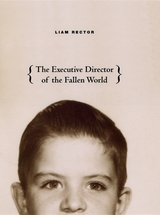
The Worry of the Far Right
The Reverend Donald Wildmon, executive director
Of the American Family Association in Tupelo,
Mississippi, birthplace of Elvis Presley, he who
Unleashed the libido of a generation, announced today
That he, the Reverend, wanted again an America
In which he could drive his convertible into town,
Park it, leave his keys in the ignition,
And worry only that it might rain,
Rather than worry about Liam Rector.
America—you are on notice. Liam Rector has little patience for “sincere” poetry, spin-doctored politicos, or moral hot air of any kind. The titles of these poems could easily serve as their own warning labels: those with clinical depression or easily triggered violent tendencies should use with caution.
The Executive Director of the Fallen World is fearless and forthright, just the sort of blunt reality check that is missing from so much of contemporary, over-stylized poetry. Rector’s stoicism and slightly murderous sense of humor pervade these poems as he doffs his hat to humility and audacity, taking on America, money, movement, marriages, and general cultural mayhem. The characters and voices in Rector’s poems are, by tragic turns, unflinching, clearly and cleanly bitter, sarcastically East Coast, and lyrical. Writing in tercets throughout, the poet breathes new life into this classic form with skill that might just send some unsuspecting readers over the edge.
As the former executive director of the Association of Writers and Writing Programs and a spirited First Amendment advocate who has sparred on screen with Bill O’Reilly, Liam Rector knows whereof he speaks in The Executive Director of the Fallen World.

Eighteen distinguished scholars and practicing officials address the problems of executive leadership in the United States, Britain, Canada, and Australia. Individual essays focus on cabinet government; domestic, military, and economic advisers; executive agencies; and personal staff for presidents and prime ministers. Provocative comparisons between and among systems make the discussions particularly insightful.

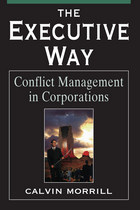
Personal and corporate scandals, compensation battles, budget worries, interdepartmental rivalries, personal enmities, and general rancor are among everyday challenges faced by executives. Morrill shows what most influences the way managers handle routine conflicts are the cultures created by their company's organizational structure: whether there is a strong hierarchy, a weak hierarchy, or an absence of any strong central authority. The issues most likely to cause conflict within corporations Morrill identifies as managerial style, competition between departments, and performance evaluations, promotions, and compensation.
Among the people whose day-to-day lives we get to know are Jacobs, a divisional executive whose intuitive understanding of the corporate hierarchy enables him to topple his incompetent superior without direct confrontation; Fuller, who through a mix of brains, guile, and connections rises from staff executive secretary to corporate vice president in a large bank; Green, an old-fashioned accounting partner in a firm being taken over by management consultants; and the "Princess of Power," "Iron Man," and the "Terminator"—executives fighting their way to the top of a successful entertainment company.
Unprecedented in its direct access to top managers, this portrayal of daily life and conflict management among corporate elites will be of interest to professionals, scholars, and practitioners in organizational culture and behavior, managerial decision making, dispute, social control, law and society, and organizational ethnography.
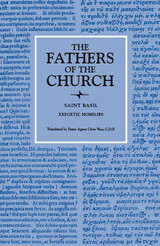
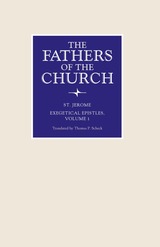

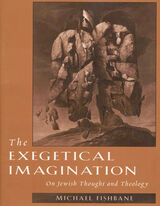
Exegesis--interpretation and explanation of sacred texts--is the quintessence of rabbinic thought. Through such means and methods, the written words of Hebrew Scripture have been extended since antiquity, and given new voices for new times. In this lucid and often poetic book, Michael Fishbane delineates the connections between biblical interpretation and Jewish religious thought.
How can a canon be open to new meanings, given that it is believed to be immutable? Fishbane discusses the nature and rationale of this interpretative process in a series of studies on ancient Jewish speculative theology. Focusing on questions often pondered in Midrash, he shows how religious ideas are generated or justified by exegesis. He also explores the role exegesis plays in liturgy and ritual. A striking example is the transfer of speculative interpretations into meditation in prayer. Cultivation of the ability to perceive many implicit meanings in a text or religious practice can become a way of living--as Fishbane shows in explaining how such notions as joy or spiritual meditations on death can be idealized and the ideal transmitted through theological interpretation. The Exegetical Imagination is a collection of interrelated essays that together offer new and profound understanding of scriptural interpretation and its central role in Judaism.

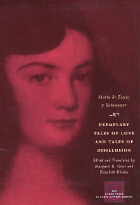
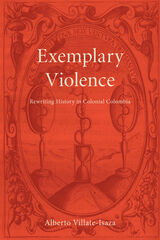
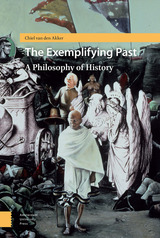

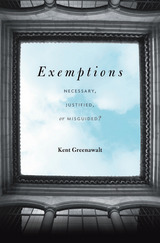
Should laws apply equally to everyone, or should some individuals and organizations be granted exemptions because of conflicting religious or moral convictions? In recent years, this question has become intensely controversial in America. The Supreme Court’s ruling on same-sex marriage, in particular, has provoked barbed debates about legal exemptions. At the core of these debates lies the question of whether basic values of equality and nondiscrimination are at odds with the right to live according to one’s religious beliefs.
In Exemptions: Necessary, Justified, or Misguided? Kent Greenawalt draws on his extensive expertise to place same-sex marriage and other controversies within a broader context. Avoiding oversimplification and reflecting a balanced consideration of competing claims and harms, he offers a useful overview of various types of exemptions and the factors that we should take into account when determining the justice of a particular exemption.
Through a close study of several cases, from doctors who will not perform abortions to institutions that do not pay taxes, Greenawalt demonstrates how to weigh competing values without losing sight of practical considerations like the difficulty of implementing a specific law. This thoughtful guide to exemptions will prove an invaluable resource as America struggles to come to terms with Obergefell v. Hodges, Burwell v. Hobby Lobby, and similar controversies. Exemptions shows how to reach the most just and desirable legal conclusions by respecting those who wish to live according to different fundamental values.
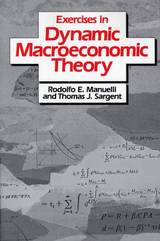
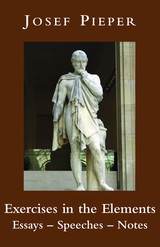
A fundamental issue for Pieper is “createdness.” He sees this as the fundamental truth of our being – all being – and the fundamental virtue we can practise is the striving to live according to our perception of real truth in any given situation.
The strength and attraction of Pieper’s writing is its direct and intuitive character which is independent of abstract systematization. He advocates staying in touch with the “real” as we experience it deep within ourselves. Openness to the totality of being – in no matter what context being reveals itself – and the affirmation of all that is founded in this totality are central pillars of all his thinking. Given the “simplicity” of this stance, it is no surprise that much of it is communicated – and successfully – through his gift for illustration by anecdote. Like Plato, this philosopher is a story-teller and, like him, very readable.

Life in a provincial capital is the subject of this study of Exeter during the Elizabethan and early Stuart ages. The author offers new insight into the way the English middle-class lived and the way in which Tudor policy achieved its aims in the provinces. During this period, Exeter was characterized by its self-sufficiency and by an oligarchical control over every aspect of its civic life. Wallace MacCaffrey describes a semi-autonomous world in itself, in which a small interlocked group of merchant families, related by marriage, kept tight control over the economy, politics, religion, education and social activities.
Taking the inclinations and actions of the local figures as his points of departure, the author discusses such great issues of the age as the Reformation, the war with Spain, and the monarchy, and examines how often they were pushed aside or subordinated to local affairs. Although the local citizen body had no part in national policy making, it was called upon to participate in carrying out the directives which came from London; it did carry out these policies, sometimes successfully, sometimes unsuccessfully.
In writing this detailed study, MacCaffrey has drawn on hitherto unused files from the records of the city.

Recent agricultural reforms in the People's Republic of China have generated great interest in the ability of the Chinese state, traditional and modern, to accommodate rapid economic change. Exhausting the Earth examines an earlier period—from the late Ming to the mid-Qing era marked by tremendous population growth, extension of the market, and increases in agricultural productivity.
Peter C. Perdue describes the relationship between agricultural production and state policies toward taxation, land clearance, dike-building; property rights, and agriculture in Hunan. During the late seventeenth and early eighteenth centuries, Hunan changed from a peripheral, sparsely populated region into a crowded, highly commercialized, grain-exporting province. State policies had stimulated this growth, but by the early nineteenth century serious signs of overpopulation, social conflict, and ecological exhaustion had surfaced. Local officials were conscious of these dangers, but the influence of the state on the economy was so weakened that they could not alter the ominous trends. The stage was set for the disintegration and rebellion of the nineteenth century. This in-depth study of official policies in one region over a long stretch of time illuminates the dynamics of official initiatives and local response.
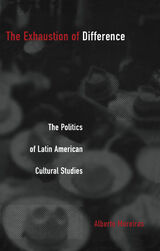
What, asks Moreiras, is the function of critical reason in the present moment? What is regionalistic knowledge in the face of globalization? Can regionalistic knowledge be an effective tool for a critique of contemporary reason? What is the specificity of Latin Americanist reflection and how is it situated to deal with these questions? Through examinations of critical regionalism, restitutional excess, the historical genealogy of Latin American subalternism, testimonio literature, and the cultural politics of magical realism, Moreiras argues that while cultural studies is increasingly institutionalized and in danger of reproducing the dominant ideologies of late capitalism, it is also ripe for giving way to projects of theoretical reformulation. Ultimately, he claims, critical reason must abandon its allegiance to aesthetic-historicist projects and the destructive binaries upon which all cultural theories of modernity have been constructed.
The Exhaustion of Difference makes a significant contribution to the rethinking of Latin American cultural studies.
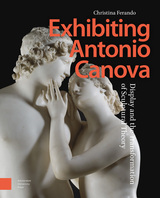

Today, nearly any group or nation with violence in its past has constructed or is planning a memorial museum as a mechanism for confronting past trauma, often together with truth commissions, trials, and/or other symbolic or material reparations. Exhibiting Atrocity documents the emergence of the memorial museum as a new cultural form of commemoration, and analyzes its use in efforts to come to terms with past political violence and to promote democracy and human rights.
Through a global comparative approach, Amy Sodaro uses in-depth case studies of five exemplary memorial museums that commemorate a range of violent pasts and allow for a chronological and global examination of the trend: the U.S. Holocaust Memorial Museum in Washington, DC; the House of Terror in Budapest, Hungary; the Kigali Genocide Memorial Centre in Rwanda; the Museum of Memory and Human Rights in Santiago, Chile; and the National September 11 Memorial Museum in New York. Together, these case studies illustrate the historical emergence and global spread of the memorial museum and show how this new cultural form of commemoration is intended to be used in contemporary societies around the world.
Download open access ebook.
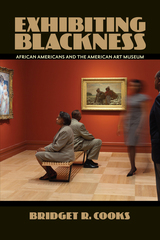
In Exhibiting Blackness, art historian Bridget R. Cooks analyzes the curatorial strategies, challenges, and critical receptions of the most significant museum exhibitions of African American art. Tracing two dominant methodologies used to exhibit art by African Americans—an ethnographic approach that focuses more on artists than their art, and a recovery narrative aimed at correcting past omissions—Cooks exposes the issues involved in exhibiting cultural difference that continue to challenge art history, historiography, and American museum exhibition practices. By further examining the unequal and often contested relationship between African American artists, curators, and visitors, she provides insight into the complex role of art museums and their accountability to the cultures they represent.
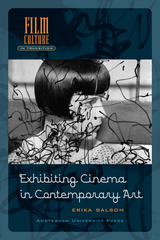

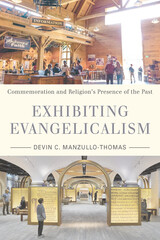
Religion is a subject often overlooked or ignored by public historians. Whether they are worried about inadvertent proselytizing or fearful of contributing to America’s ongoing culture wars, many heritage professionals steer clear of discussing religion’s formative role in the past when they build collections, mount exhibits, and develop educational programming. Yet religious communities have long been active contributors to the nation’s commemorative landscape.
Exhibiting Evangelicalism provides the first account of the growth and development of historical museums created by white evangelical Christians in the United States over the twentieth and twenty-first centuries. Exploring the histories of the Museum of the Bible, the Billy Graham Center Museum, the Billy Sunday Home, and Park Street Church, Devin C. Manzullo-Thomas illustrates how these sites enabled religious leaders to develop a coherent identity for their fractious religious movement and to claim the centrality of evangelicalism to American history. In their zeal to craft a particular vision of the national past, evangelicals engaged with a variety of public history practices and techniques that made them major players in the field—including becoming early adopters of public history’s experiential turn.
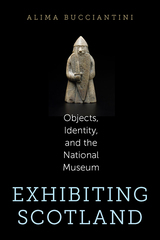
In Exhibiting Scotland, Alima Bucciantini traces how these collections have helped tell the changing stories of this country for centuries and how the museum reflects the Scots' continuing negotiation of their place within modern Britain.


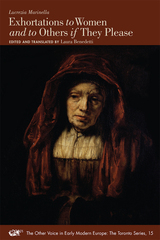
—Maria Galli Stampino
Associate Professor of French and Italian
University of Miami

Bronka Schneider and her husband, Joseph, were two of the thirty thousand Austrian Jews admitted as refugees to Great Britain between March 1938 and 2 September 1939. It was not until 1960, however, that Schneider wrote her memoir about the year she spent as a housekeeper, with Joseph as a butler, in a Scottish castle.
Schneider tells of daily encounters—with her employers, the English lady and her husband, a retired British civil servant who had spent many years in India; the village locals; other refugees; and a family of evacuees from the slums of Glasgow.
The editors have divided this memoir into chapters, adding headlines from the London Times as epigraphs. These headlines, reporting the escalating events of World War II, are in stark contrast to daily activities of the residents of this isolated region of Scotland. A commentary by Erika Bourguignon provides historical, political, and cultural background of this period.
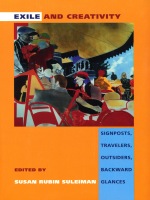
In essays that range chronologically from the Renaissance to the 1990s, geographically from the Danube to the Andes, and historically from the Inquisition to the Holocaust, the complexities and tensions of exile and the diversity of its experiences are examined. Recognizing exile as an interior experience as much as a physical displacement, this collection discusses such varied topics as intellectual exile and seventeenth-century French literature; different versions of home and of the novel in the writings of Bakhtin and Lukács; the displacement of James Joyce and Clarice Lispector; a young journalist’s meeting with James Baldwin in the south of France; Jean Renoir’s Hollywood years; and reflections by the descendents of European emigrés. Strikingly, many of the essays are themselves the work of exiles, bearing out once more the power of the personal voice in scholarship.
With the exception of the contribution by Henry Louis Gates Jr., these essays were originally published in a special double issue of Poetics Today in 1996. Exile and Creativity will engage a range of readers from those whose specific interests include the problems of displacement and diaspora and the European Holocaust to those whose broad interests include art, literary and cultural studies, history, film, and the nature of human creativity.
Contributors. Zygmunt Bauman, Janet Bergstrom, Christine Brooke-Rose, Hélène Cixous, Tibor Dessewffy, Marianne Hirsch, Denis Hollier, Henry Louis Gates Jr., Linda Nochlin, Leo Spitzer, Susan Rubin Suleiman, Thomas Pavel, Doris Sommer, Nancy Huston, John Neubauer, Ernst van Alphen, Alicia Borinsky, Svetlana Boym, Jacqueline Chénieux-Gendron
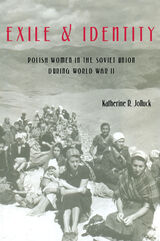
Upon arrival in remote areas of the Soviet Union, they were deposited in prisons, labor camps, special settlements, and collective farms, and subjected to tremendous hardships and oppressive conditions. In 1942, some 115,000 Polish citizens—only a portion of those initially exiled from their homeland—were evacuated to Iran. There they were asked to complete extensive questionnaires about their experiences.
Having read and reviewed hundreds of these documents, Jolluck reveals not only the harsh treatment these women experienced, but also how they maintained their identities as respectable women and patriotic Poles. She finds that for those exiled, the ways in which they strove to recreate home in a foreign and hostile environment became a key means of their survival.
Both a harrowing account of brutality and suffering and a clear analysis of civilian experiences in wartime, Exile and Identity expands the history of war far beyond the military battlefield.
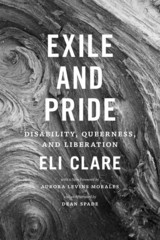
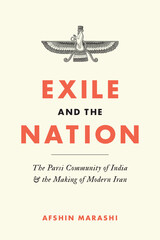
Honorable Mention, Hamid Naficy Iranian Studies Book Award from the Association of Iranian Studies
In the aftermath of the seventh-century Islamic conquest of Iran, Zoroastrians departed for India. Known as the Parsis, they slowly lost contact with their ancestral land until the nineteenth century, when steam-powered sea travel, the increased circulation of Zoroastrian-themed books, and the philanthropic efforts of Parsi benefactors sparked a new era of interaction between the two groups.Tracing the cultural and intellectual exchange between Iranian nationalists and the Parsi community during the late nineteenth and early twentieth centuries, Exile and the Nation shows how this interchange led to the collective reimagining of Parsi and Iranian national identity—and the influence of antiquity on modern Iranian nationalism, which previously rested solely on European forms of thought. Iranian nationalism, Afshin Marashi argues, was also the byproduct of the complex history resulting from the demise of the early modern Persianate cultural system, as well as one of the many cultural heterodoxies produced within the Indian Ocean world. Crossing the boundaries of numerous fields of study, this book reframes Iranian nationalism within the context of the connected, transnational, and global history of the modern era.
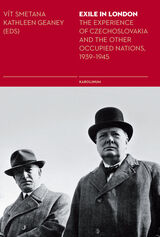

At midcentury, two distinct Polish immigrant groups—those Polish Americans who were descendants of economic immigrants from the turn of the twentieth century and the Polish political refugees who chose exile after World War II and the communist takeover in Poland—faced an uneasy challenge to reconcile their concepts of responsibility toward the homeland.
The new arrivals did not consider themselves simply as immigrants, but rather as members of the special category of political refugees. They defined their identity within the framework of the exile mission, an unwritten set of beliefs, goals, and responsibilities, placing patriotic work for Poland at the center of Polish immigrant duties.
In The Exile Mission, an intriguing look at the interplay between the established Polish community and the refugee community, Anna Jaroszyńska–Kirchmann presents a tale of Polish Americans and Polish refugees who, like postwar Polish exile communities all over the world, worked out their own ways to implement the mission’s main goals. Between the outbreak of World War II and 1956, as Professor Jaroszyńska–Kirchmann demonstrates, the exile mission in its most intense form remained at the core of relationships between these two groups.
The Exile Mission is a compelling analysis of the vigorous debate about ethnic identity and immigrant responsibility toward the homeland. It is the first full–length examination of the construction and impact of the exile mission on the interactions between political refugees and established ethnic communities.

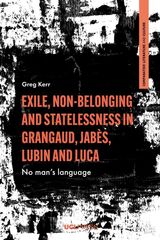
Poetry has often been understood as a powerful vector of collective belonging. The idea that certain poets are emblematic of a national culture is one of the chief means by which literature historicizes itself, inscribes itself in a shared cultural past, and supplies modes of belonging to those who consume it. But, how does the exiled, migrant, or translingual poet complicate this narrative? For Armen Lubin, Ghérasim Luca, Edmond Jabès, and Michelle Grangaud, the practice of poetry is inseparable from a sense of restlessness or unease. Ranging across borders within and beyond the Francosphere—from Algeria, Armenia, Egypt, and Romania—this book shows how a poetic practice inflected by exile, statelessness, or non-belonging has the potential to disrupt long-held assumptions about the relation between subjects, the language they use, and the place from which they speak.

As sustainability and eco-responsibility become a part of our everyday cultural conversation, we’re finally being forced to acknowledge that what we consume matters. What we fail to realize is that we unconsciously, continually, and at times violently consume much more than just food—including celebrities. The Exile of Britney Spears takes the ubiquitous pop star of its title as its primary example, explaining that we have consumed, digested, and eliminated Britney Spears in a process uniquely characteristic of American popular culture. In Christopher Smit’s provocative account of the sociological, aesthetic, and political outcomes of this new mediated cannibalism, he offers the idea of exile as a new metaphor for the outcome of popular consumption. By investigating the psychological, personal, and social matrix of Britney’s rise and fall, he outlines the process of her inevitable exile from global taste and favor.

Brian Aldiss is one of the great figures in science fiction. Classics in the genre, his books serve as portals to other worlds, captivating readers with strange and shocking narratives that have been a force for further experimentation within the genre. In addition to a highly successful career as a writer of both fiction and science fiction, Aldiss is also an accomplished artist and literary critic.
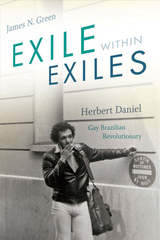

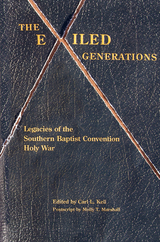
Until now, the stories of this “lost generation” have never been fully told. In this collection, Professor Kell presents a diverse and wide range of voices. Some are well-known Baptist leaders, while others are ordinary people caught up in the remarkable changes in Baptist life over the past few decades. Here, they recount their feelings of loss as they were severed from youth fellowships and removed from church rolls. Many describe the lingering emotional effects of the heartbreaking conflict that dominated their childhood and adolescence. Their recollections reveal the full range of responses—anger, sadness, pathos, humor, intense inner reflection—to these enormous shifts. This volume shows the extent to which this group has struggled and wandered in emotional and religious exile.
The Exiled Generations comprises rich primary sources for scholars and students who are exploring the profound strife that has rocked the Southern Baptist Convention. These deeply moving accounts will offer invaluable assistance to researchers analyzing the impact of the seismic changes within the denomination over the past thirty-five years.
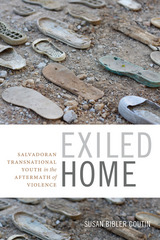
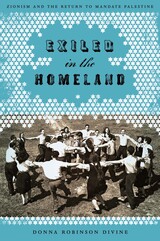
Offering a new perspective on Zionism, Exiled in the Homeland draws on memoirs, newspaper accounts, and archival material to examine closely the lives of the men and women who immigrated to Palestine in the early twentieth century. Rather than reducing these historic settlements to a single, unified theme, Donna Robinson Divine's research reveals an extraordinary spectrum of motivations and experiences among these populations.
Though British rule and the yearning for a Jewish national home contributed to a foundation of solidarity, Exiled in the Homeland presents the many ways in which the message of emigration settled into the consciousness of the settlers. Considering the benefits and costs of their Zionist commitments, Divine explores a variety of motivations and outcomes, ranging from those newly arrived immigrants who harnessed their ambition for the goal of radical transformation to those who simply dreamed of living a better life. Also capturing the day-to-day experiences in families that faced scarce resources, as well as the British policies that shaped a variety of personal decisions on the part of the newcomers, Exiled in the Homeland provides new keys to understanding this pivotal chapter in Jewish history.
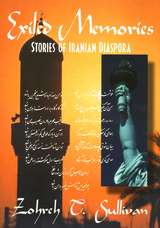
These are the words of one Iranian emigre, driven from Tehran by the revolution of 1979. They are echoed time and again in this powerful portrayal of loss and survival. Impelled by these word and her own concerns about nationality and identity, Zohreh Sullivan has gathered together here the voices of sixty exiles and emigres. The speakers come from various ethnic and religious backgrounds and range in age from thirteen to eighty-eight. Although most are from the middle class, they work in a variety of occupations in the United States. But whatever their differences, here they engage in remembering the past, producing a discourse about their lives, and negotiating the troubled transitions from one culture to another.
Unlike man other Iranian oral history projects, Exiled Memories looks at the reconstruction of memory and identity through diasporic narratives, through a focus on the Americas rather than on Iran. The narratives included here reveal the complex ways in which events and places transform identities, how overnight radical s become conservatives, friends become enemies, the strong become weak. Indeed, the narratives themselves serve this function -- serving to transfer or transform power and establish credibility. They reveal a diverse group of people in the process of knitting the story of themselves with the story of the collective after it has been torn apart.
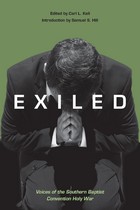
tactics to gain top positions and then used their power to purge Baptist seminary presidents and professors, church pastors, lay leaders, and women from positions of responsibility. America's largest Christian, non-Catholic denomination is firmly locked in a “holy war” to secure its churches and membership for a never-ending struggle against a liberal culture.
Exiled: Voices of the Southern Baptist Convention Holy War is a compilation of first-person narratives by conservative and moderate ministers and lay leaders who were stripped of their positions and essentially became pariahs in the churches to which they had devoted their lives.
While other books have described the takeover in historical, political, and theological terms, Exiled is different. Individual people tell their personal stories, revealing the struggle and heartache that resulted from being vilified, dispossessed, and exiled. Kell includes a variety of perspectives-from lay preachers and church members to prominent former SBC leaders such as James Dunn and Carolyn Crumpler.
The emotion captured on the pages-sadness, shock, disbelief, resignation,
and anger-will make Exiled moving even to readers who know little about the Southern Baptist movement. Exiled will also be of particular interest to historians, sociologists, philosophers of religion, and rhetorical historians.
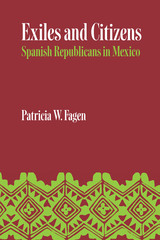
At the end of the Spanish civil war, Mexico was the only country to offer open refuge to the thousands of Republican emigrés who fled from Spain in 1939–1940. Exiles and Citizens is a study of these political exiles, especially those with intellectual and professional backgrounds and ambitions. It focuses on their adjustment to Mexico, on their continued ties to Spain, and on their impact on Mexican development.
The critical dilemma faced by the Spanish exiles was that, despite having fought for their political and social ideals in Spain, they forfeited in exile their active role in Spanish history. In Mexico they found a political and social system that seemed to include many of the ideals that had inspired the Spanish Republic; moreover, they were able to incorporate themselves economically, professionally, and intellectually into Mexican national life. Yet, because they were not native-born citizens, they had little or no creative part to play in the politics of their adopted country.
For Mexico, the impact of the refugees from Spain was enormous. Integrated from the first into nearly all intellectual, professional, and cultural fields, their skills proved an important catalyst to Mexican development. Yet, outside these fields, Mexico was never an effective "melting pot." The Republicans themselves were divided in their loyalties, and the Mexicans, from the beginning, were reluctant to encourage the full participation of their guests in national affairs.
Two goals were shared by most of the exiles: to ensure that the world would remember the liberal, creative, and open Spain they had created and thus reject Franco; to show their gratitude by working for the benefit and progress of Mexico. These goals, although frequently contradictory, sustained the emigration and gave meaning to exile. The refugees tried to maintain their identity by coming together in formal and informal associations that were intended either to act on behalf of the homeland or to re-create the Spanish Republican structures and values in exile. To maintain a Spanish identity, however, proved difficult, and for the second and third generations in Mexico, the initial goals had already lost their meaning. For them, economic and professional, as well as familial, ties were strongly Mexican.
Spanish Republicans in Mexico represented a fairly rare phenomenon: a large group of skilled, relatively well educated immigrants to a country where persons of their attainments and status were not numerous. Moreover, as political exiles, they approached the problems of acculturation differently from economic emigrants. Patricia Fagen's study thus offers a further understanding of an important exile community and the characteristics that set it apart from other examples of immigrant experiences. In addition, the study sheds new light on the intellectual history of Mexico and the far-reaching effects of the Spanish civil war.

READERS
Browse our collection.
PUBLISHERS
See BiblioVault's publisher services.
STUDENT SERVICES
Files for college accessibility offices.
UChicago Accessibility Resources
home | accessibility | search | about | contact us
BiblioVault ® 2001 - 2024
The University of Chicago Press


